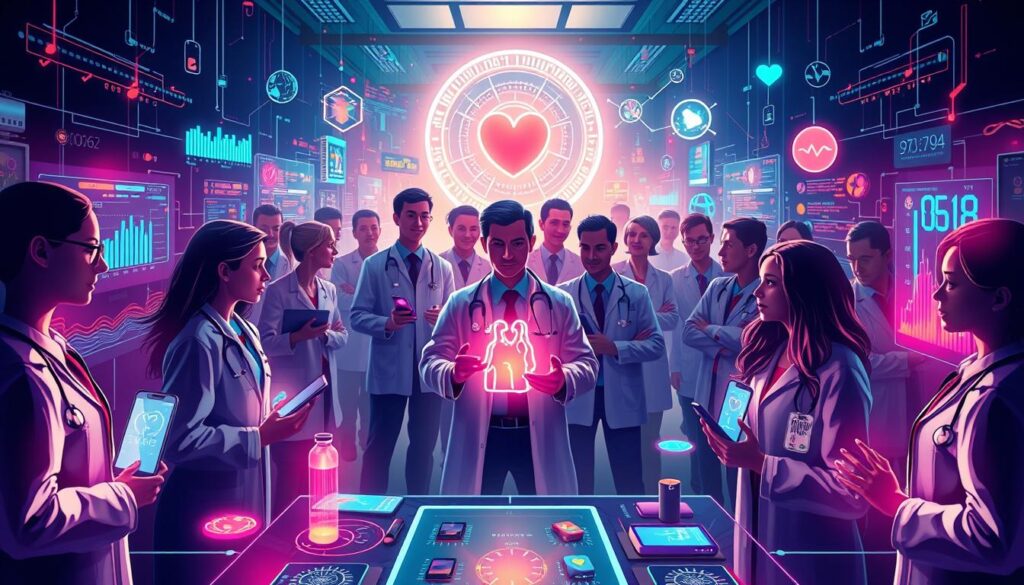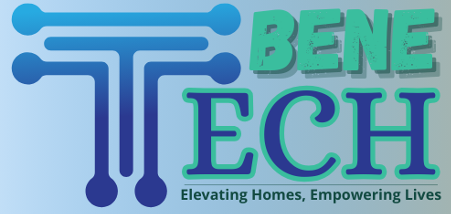The world of healthcare is changing fast, thanks to digital health and medical innovation. The “Health Tech Nerds” are leading this change. They explore new breakthroughs that could change patient care and health outcomes.
There are many new tools like AI for diagnosis and wearable devices. These changes are happening quickly. Health tech fans are using their skills to help make these changes happen.
Table of Contents
Key Takeaways
- Discover the latest trends and advancements in digital health and medical technology
- Explore how health tech entrepreneurs and startups are shaping the future of healthcare
- Gain insights into the role of artificial intelligence, telehealth, and wearable devices in transforming patient care
- Understand the importance of data privacy and regulations in the health tech industry
- Learn about educational resources and networking opportunities for health tech enthusiasts
Understanding the Role of Health Tech in Healthcare
Biotech nerds and digital health fans know health tech is a wide range of tools. These tools help improve healthcare delivery. They include telehealth platforms and AI-driven diagnostic aids.
These cutting-edge solutions are changing how healthcare is given and managed. They do this in many different settings.
What is Health Technology?
Health technology uses science to create products and services that better healthcare. It includes digital health solutions, medical devices, and information systems. These tools help healthcare professionals and patients.
Importance of Digital Health
Digital health solutions are very important. Health IT experts say they make patient care better and operations smoother. They help make healthcare more efficient.
Technologies like telemedicine and electronic health records are changing healthcare. They make it easier to get care and manage health information.
Key Innovations in Medical Technology
Some big innovations in medical tech include:
- Telemedicine platforms for remote consultations
- AI tools for early disease detection and personalized care
- Advanced devices like wearable sensors for real-time health data
- Precision medicine for treatments based on individual health
These technologies are making healthcare better and more affordable. They improve patient outcomes and the quality of care.
“The integration of health technology is transforming the way we approach healthcare, empowering biotech nerds and digital health fanatics to reimagine the future of medicine.”
| Technology | Application | Impact |
|---|---|---|
| Telemedicine | Remote consultations and virtual care | Improved access to healthcare, especially for underserved populations |
| AI-powered diagnostics | Early disease detection and personalized treatment | Enhanced accuracy and efficiency in diagnosis and treatment planning |
| Wearable sensors | Real-time health data monitoring | Improved patient engagement and self-management of chronic conditions |
The Rise of Telehealth Solutions
In recent years, telehealth has seen a big increase in popularity. It’s changing how we get healthcare. e-Health experts and mHealth fans are all about this new way. It lets people get medical help online, check in with doctors, and get health services through digital tools.
Overview of Telehealth
Telehealth uses many technologies to let doctors and patients talk online. It includes things like virtual doctor visits and checking in on patients from afar. These digital tools use the internet and mobile devices to connect people with healthcare providers.
Benefits for Patients and Providers
- Improved access to care: Telehealth makes it easier for people to get medical help, especially in hard-to-reach areas.
- Increased convenience: Patients can see doctors from home, saving time and money on travel.
- Enhanced efficiency: Doctors can see more patients and work better with telehealth, saving time and money.
- Effective patient management: Doctors can keep an eye on patients from afar, helping them get better care sooner.
Telehealth is changing healthcare for the better. It’s making healthcare easier and more accessible for everyone. e-Health experts and mHealth fans are leading this change, making healthcare better and more available.
| Telehealth Newsletter | Subscription Numbers |
|---|---|
| Telehealth.org’s Telehealth & Technology | 420,000 |
| Healthcare IT News’ Telehealth Connection | Twice monthly |
| Connected Health Pulse | Daily, weekly, and monthly |
| OpenLoop®’s Telehealth News Recap | Monthly |
| Xtelligent Healthcare’s mHealthIntelligence | Latest information on mHealth, RPM, and virtual care |
“Telehealth has the potential to transform healthcare delivery, making it more accessible, convenient, and effective for patients and providers alike.”
Telehealth is key to the future of healthcare. e-Health experts and mHealth fans are leading the way. They’re making healthcare better and more available for everyone.
Wearable Technologies in Health Management
The world of medical device geeks and biomedical data analysts is changing fast. Wearable technologies are leading this change. These devices help people manage their health better. They range from smart rings to continuous glucose monitors.
Popular Wearable Devices
Devices like the ŌURA smart ring and Dexcom’s continuous glucose monitors are at the forefront. ŌURA has sold over 2.5 million rings and is set to make around $500 million by 2024. These wearables mix fun features with serious health sensors. They give users instant insights into their health.
Impact on Personal Health Tracking
Wearable tech is changing how we track our health. It lets users check their heart rate, sleep, and activity levels. This data helps people make better health choices and manage their well-being.
| Wearable Device | Key Features | Impact on Health Tracking |
|---|---|---|
| ŌURA Smart Ring | – Continuous heart rate monitoring – Sleep tracking – Activity and recovery metrics | – Enables users to optimize sleep and manage stress – Provides insights into physical and mental well-being |
| Dexcom Continuous Glucose Monitor | – Real-time glucose level tracking – Alerts for high or low blood sugar – Compatibility with insulin pumps | – Helps individuals with diabetes manage their condition more effectively – Supports proactive healthcare decision-making |
“Wearable devices are revolutionizing personal health management, empowering medical device geeks and biomedical data analysts alike to take control of their well-being.”
The Role of Artificial Intelligence in Healthcare
Health tech nerds and healthcare technology enthusiasts are seeing big changes. Artificial intelligence (AI) is leading the way. It’s changing healthcare by making diagnostics easier and improving patient care.
The global market for AI in healthcare is expected to hit USD 173.55 billion by 2029. It will grow at a CAGR of 40.2%. This shows AI’s big role in healthcare’s future.
AI Applications in Diagnostics
AI is making a big difference in diagnostics. It can look at lots of data, like medical images and patient records. This helps find health issues early and accurately.
Companies like Enlitic are using AI to find cancer in lungs up to 18 months before others can. This means patients can get help sooner, leading to better health outcomes.
Enhancing Patient Care with AI
AI is also changing how doctors talk to patients. Healthcare chatbots can answer up to 80% of simple questions. They work 24/7, saving money and time.
These chatbots can suggest treatments and offer personalized care. They even help with scheduling and keeping medical records. This makes patient care better.
“By 2025, AI-powered technology will be used in 90% of hospitals for remote patient monitoring and early diagnosis.”
We’ll see more AI in healthcare soon. It will lead to better care, smoother workflows, and a focus on patients. Healthcare technology enthusiasts are excited for these changes.
The Future of Health Tech: What’s Next?
Medical innovation geeks and biotech nerds are excited for the future of health tech. It will be both exciting and transformative. We can expect to see new gene therapies and nanotechnology in healthcare soon.
Emerging Technologies to Watch
Advanced gene therapies are getting a lot of attention. They could treat genetic disorders at their source. Nanotechnology could also change drug delivery, making treatments more precise.
Brain-computer interfaces are also drawing a lot of interest. They could let people communicate with devices using their brains. This could help with rehabilitation and even improve our minds.
Potential Challenges Ahead
Health tech’s future is promising but comes with challenges. Data privacy is a big concern. We need to keep patient information safe.
Regulations can slow down new tech adoption. Innovators and policymakers must work together. Making sure everyone has access to these technologies is also a big challenge.
“The future of healthcare is not just about the next big thing – it’s about seamlessly integrating cutting-edge technologies into the fabric of our healthcare system to improve patient outcomes and empower medical professionals.”
Data Privacy in Health Technology
Digital health fanatics and health IT gurus are diving deep into medical innovation. Data privacy is a key issue. The Health Insurance Portability and Accountability Act (HIPAA) guides protecting patient info in healthcare. Following HIPAA rules is a must for digital health companies to keep patient data safe.
Understanding HIPAA Regulations
HIPAA sets strict rules for handling protected health information (PHI). This includes electronic, paper, and oral data. Health tech companies must use strong security to stop unauthorized access and data breaches.
They need to use encryption, multi-factor authentication, and do regular security checks. This keeps sensitive info safe.
Safeguarding Patient Information
The digital health world is always changing. Digital health fanatics and health IT gurus must keep patient privacy a top priority. Using data anonymization, access controls, and having good incident response plans helps build trust.
By focusing on data privacy, digital health innovators show they care about patients. This earns the trust of the communities they serve.
“Maintaining patient trust through stringent data protection practices is paramount in the ever-evolving world of health technology.”

In the fast-changing digital health field, data privacy is a big concern. By following HIPAA and using strong security, health tech companies can create a trusted space. Here, innovation and patient well-being can thrive together.
The Impact of Mobile Health Apps
The rise of mobile health, or mHealth, has changed how we manage our health. E-health experts and mHealth aficionados now have tools to help them. These apps offer many features for different health needs.
Popular Health Apps in the Market
The market is full of health apps that are easy to use. They help with fitness, mental health, and managing chronic diseases. For example, apps track your exercise, offer mindfulness exercises, and remind you to take your medicine.
Benefits for Your Daily Health Management
- Personalized health insights: Mobile apps use data to give you health tips that fit you.
- Improved medication adherence: Apps send reminders to help you stay on track with your medicine.
- Lifestyle recommendations: Many apps work with wearables to suggest better diet and exercise plans.
The mobile health app market is growing fast. New technologies like AI and machine learning are making these apps even better. They are changing how we manage our health every day.
“Mobile health apps have become an indispensable tool in my daily health routine. The personalized insights and real-time monitoring have empowered me to take a more proactive approach to my well-being.”
– Jane Doe, Certified Health Coach
| Popular mHealth Apps | Key Features | Target Audience |
|---|---|---|
| Fitbit | Fitness tracking, sleep monitoring, heart rate tracking | Health-conscious individuals, fitness enthusiasts |
| MyFitnessPal | Calorie counting, nutritional analysis, weight management | Weight loss seekers, health-conscious individuals |
| Calm | Meditation, sleep stories, mindfulness exercises | Stress management, mental well-being |
| Glucose Buddy | Diabetes management, blood glucose tracking, medication reminders | Individuals with diabetes |
Health Tech Startups Shaping the Industry
The healthcare tech world is full of new startups making big changes. These innovators, including medical device geeks and data analysts, are leading the way. They bring fresh ideas and advanced solutions to the table.
Notable Startups to Follow
Startups like Abridge and Suki are changing the game with AI scribes. They help doctors spend more time with patients. Maven Clinic is also making a splash in women’s health, offering virtual care for families.
Investment Trends in Health Tech
Investors see a lot of promise in health tech. Rock Health reports that while deals might be down, the money being invested is still strong. The focus is on AI, telehealth, and digital treatments to better care for patients.
| Health Tech Newsletter | Focus Area | Notable Insights |
|---|---|---|
| Health Tech Nerds | Weekly updates on health tech and services news | Analytical insights on payor, provider, and venture topics |
| Out of Pocket | Wide range of healthcare topics with a focus on education and events | Utilizes humor and memes to make complex healthcare issues approachable |
| Gist Weekly | Friday newsletter containing 3 key healthcare stories and data-driven graphics | Provides perspectives on significant healthcare news from Kaufman Hall |
As health tech keeps growing, the innovators behind these startups are leading the charge. They use new tech to improve healthcare, making it better for patients and doctors alike.

Education and Resources for Health Tech Enthusiasts
For health tech nerds and enthusiasts, keeping up with new tech is key. Luckily, many online courses, certifications, books, and publications are available. They help deepen your understanding of this fast-changing field.
Online Courses and Certifications
Coursera and edX have many health tech programs. They cover digital health, medical tech, and data analytics in healthcare. These courses give you deep knowledge and practical skills. They also offer certifications that boost your career.
Recommended Books and Publications
- Health Affairs: A top journal in health policy and research. It offers insights into the latest trends and best practices in healthcare tech.
- NEJM Catalyst: From the New England Journal of Medicine, it focuses on healthcare delivery and technology’s role in better patient outcomes.
- Rock Health Reports: Detailed analyses and reports from a leading digital health investment firm. They give valuable insights into the health tech startup world.
These resources, along with many online courses and certifications, equip health tech enthusiasts. They help navigate the fast-changing world of medical innovation.
Building Your Network in the Health Tech Community
Want to be a medical innovation geek or biotech nerd? Building a strong network is key. Joining groups and going to big events can help. You’ll make important connections, learn new things, and stay ahead in the health tech world.
Joining Professional Organizations
Groups like HIMSS and HealthTech4Medicaid are great for health tech fans. They offer lots of resources and chances to meet people. You’ll get to talk with leaders, learn from events, and share ideas on digital health and innovation.
Attending Health Tech Events and Conferences
Get involved by going to big events like the HLTH conference and CES Digital Health Summit. These places are full of smart people, new ideas, and chances to meet others. You’ll learn a lot, see what’s new, and make connections that can help your career.

